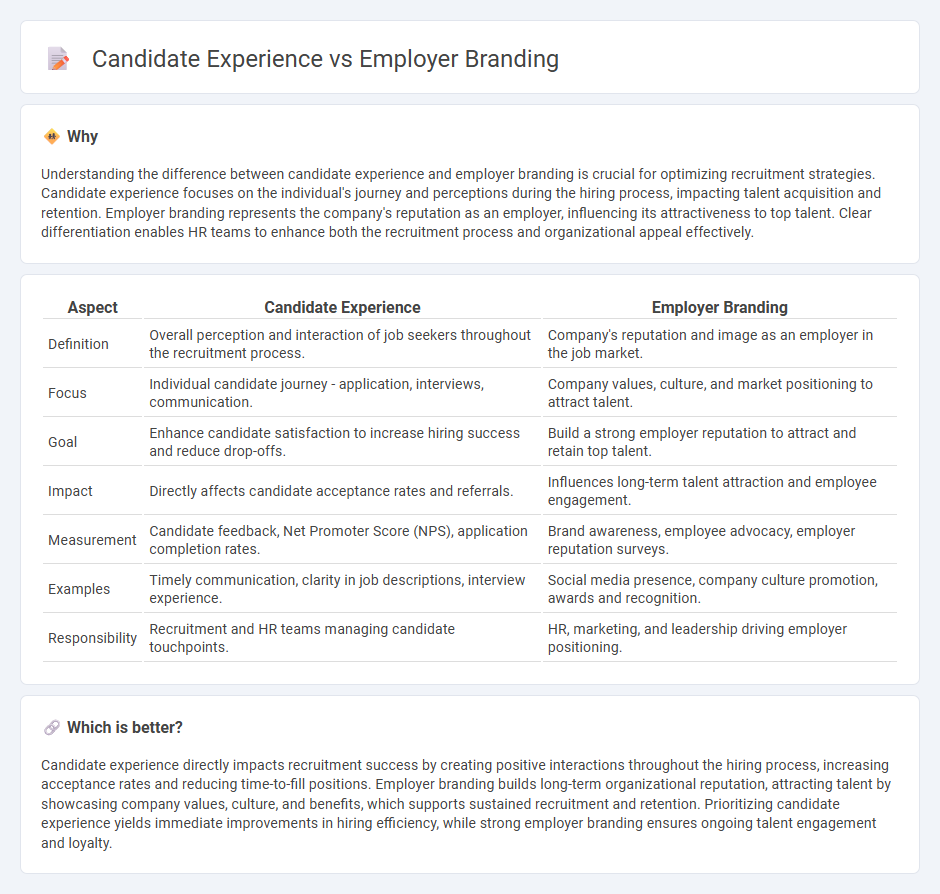
Candidate experience shapes perceptions of a company during the hiring process, influencing talent attraction and retention. Employer branding communicates an organization's values and culture to build a strong reputation that appeals to top talent. Explore how optimizing both elements enhances recruitment success and workforce quality.
Why it is important
Understanding the difference between candidate experience and employer branding is crucial for optimizing recruitment strategies. Candidate experience focuses on the individual's journey and perceptions during the hiring process, impacting talent acquisition and retention. Employer branding represents the company's reputation as an employer, influencing its attractiveness to top talent. Clear differentiation enables HR teams to enhance both the recruitment process and organizational appeal effectively.
Comparison Table
| Aspect | Candidate Experience | Employer Branding |
|---|---|---|
| Definition | Overall perception and interaction of job seekers throughout the recruitment process. | Company's reputation and image as an employer in the job market. |
| Focus | Individual candidate journey - application, interviews, communication. | Company values, culture, and market positioning to attract talent. |
| Goal | Enhance candidate satisfaction to increase hiring success and reduce drop-offs. | Build a strong employer reputation to attract and retain top talent. |
| Impact | Directly affects candidate acceptance rates and referrals. | Influences long-term talent attraction and employee engagement. |
| Measurement | Candidate feedback, Net Promoter Score (NPS), application completion rates. | Brand awareness, employee advocacy, employer reputation surveys. |
| Examples | Timely communication, clarity in job descriptions, interview experience. | Social media presence, company culture promotion, awards and recognition. |
| Responsibility | Recruitment and HR teams managing candidate touchpoints. | HR, marketing, and leadership driving employer positioning. |
Which is better?
Candidate experience directly impacts recruitment success by creating positive interactions throughout the hiring process, increasing acceptance rates and reducing time-to-fill positions. Employer branding builds long-term organizational reputation, attracting talent by showcasing company values, culture, and benefits, which supports sustained recruitment and retention. Prioritizing candidate experience yields immediate improvements in hiring efficiency, while strong employer branding ensures ongoing talent engagement and loyalty.
Connection
Candidate experience directly influences employer branding by shaping how potential employees perceive a company's culture and values throughout the recruitment process. Positive interactions during application, interviews, and onboarding enhance employer reputation, leading to higher-quality talent attraction and retention. Companies investing in seamless candidate journeys strengthen their employer brand, driving competitive advantage in the talent marketplace.
Key Terms
**Employer Branding:**
Employer branding encompasses a company's reputation, values, and culture conveyed to attract top talent and differentiate from competitors. A strong employer brand increases candidate engagement, fosters employee loyalty, and boosts recruitment efficiency by showcasing authentic workplace experiences. Discover how optimizing employer branding can transform your talent acquisition strategy.
Employee Value Proposition (EVP)
Employer branding shapes a company's reputation to attract top talent by highlighting its culture, values, and career opportunities, while candidate experience emphasizes the quality of interactions during recruitment to ensure positive perceptions at every touchpoint. The Employee Value Proposition (EVP) integrating authentic employer branding with seamless candidate experience creates a compelling narrative that differentiates the organization in competitive talent markets. Discover how aligning EVP enhances both employer branding and candidate experience for sustained talent acquisition success.
Corporate Culture
Corporate culture significantly shapes both employer branding and candidate experience, reflecting the company's core values and work environment. Strong employer branding highlights authentic cultural elements, attracting talent aligned with organizational goals, while a positive candidate experience ensures seamless engagement and reinforces cultural fit throughout the hiring process. Explore more insights on enhancing corporate culture to boost employer branding and optimize candidate experience.
Source and External Links
What is Employer Branding? - Universum Global - Employer branding is the strategic process of creating and maintaining a company's reputation as a great place to work, focusing on elements like company culture and employee benefits.
What is employer branding? - Greenhouse - Employer branding refers to how a company is perceived as a place to work by current, past, and potential employees, rooted in existing company culture.
Employer branding - Wikipedia - Employer branding describes an employer's reputation as a place to work and their employee value proposition, aimed at attracting, engaging, and retaining top talent.
 dowidth.com
dowidth.com